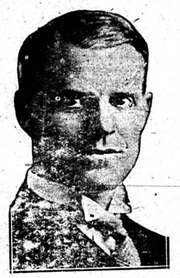Joseph Tweed Shaw
| Joseph Tweed Shaw | |
|---|---|
 |
|
| Member of the Canadian House of Commons | |
|
In office 1921–1925 |
|
| Preceded by | Thomas Tweedie |
| Succeeded by | Richard Bennett |
| Constituency | Calgary West |
| Member of the Legislative Assembly of Alberta | |
|
In office June 28, 1926 – June 19, 1930 |
|
| Preceded by | Charles Mitchell |
| Succeeded by | John Mackintosh |
| Constituency | Bow Valley |
| Leader of the Alberta Liberal Party | |
|
In office 1926–1930 |
|
| Preceded by | John Bowen |
| Succeeded by | John McDonald |
| Personal details | |
| Born |
August 30, 1883 Port Arthur, Ontario |
| Died | July 12, 1944 (aged 60) Calgary, Alberta |
| Political party |
Independent Labour, Liberal |
| Occupation | politician |
Joseph Tweed Shaw (August 30, 1883 – July 12, 1944) was a Canadian politician. He served in the Canadian House of Commons from 1921 to 1925 as an independent Labour Member of Parliament (MP), and later became leader of the Alberta Liberal Party.
Shaw was born at Port Arthur in Northern Ontario, and received his early education in Calgary, Alberta. He later received a Bachelor of Laws degree from the University of Michigan, and returned to Alberta to work as a barrister. He served in the Canadian Expeditionary Force during World War I from 1916 to 1918. In religion, he was a Presbyterian.
He was elected to the Canadian House of Commons in the 1921 federal election, defeating future Conservative Prime Minister Richard Bennett by twelve votes in Calgary West. Shaw is usually considered to have been a Labour candidate but he actually ran as an independent, supported by both the United Farmers of Alberta (UFA) and the Alberta branch of the Dominion Labor Party (DLP). He attended a Progressive Party convention in 1922 and may have been a candidate for that party's leadership, but he reaffirmed his independence from all parties in 1923. During his time in parliament, Shaw was associated with the Ginger Group of radical Labour and Progressive representatives.
...
Wikipedia
